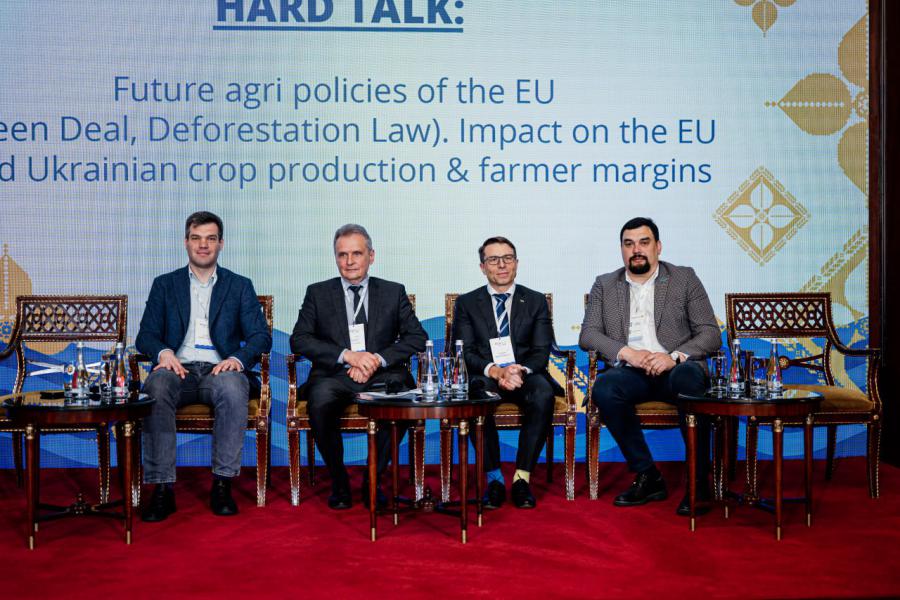BLACK SEA GRAIN. KYIV conference brought together grain market participants and experts on April 18

Yesterday, April 18, 2024, “BLACK SEA GRAIN. KYIV”, one of the largest grain forums in Ukraine, was held, providing exclusive analytics of the agricultural market from world experts, discussing global macroeconomic and regional trends, long-term forecasts, effective communication and contacts with international industry leaders.
The event brought together hundreds of leading international producers and processors of grains and oilseeds, traders, agricultural holdings, banks and investment funds, trading exchanges, government representatives and industry associations, logistics, brokerage, insurance, surveying, legal and other companies.
The opening remarks were delivered by Sergey Feofilov, CEO of UkrAgroConsult, which is celebrating its 30th anniversary this year.
Immediately after the greetings, the “HARD TALK” started on the topic: Future EU agricultural policy (Green Deal, Deforestation Law). Impact on the production of grains and oilseeds in the EU and Ukraine and margins/profitability of farmers.
The panel was moderated by Leonid Kozachenko, President of the Ukrainian Agrarian Confederation.
The President of the UAC outlined the situation on the grain market in the extremely difficult conditions of the war and emphasized such important issues as transport and logistics, problems of financial support for agricultural market participants, European integration processes and challenges.
Leonid Kozachenko also emphasized the importance of river navigation, in particular the importance of rebuilding the Kakhovka dam and building more modern locks than those that existed before.
Oleh Khomenko, CEO of the Ukrainian Agribusiness Club, focused on trade barriers and disputes and negotiations with Poland and the EU.
The UCAB CEO noted: “Yesterday, in an interview, the Polish president said that there is an American farmer in Ukraine, that our land owners are Americans. How absurd is it that such issues are discussed at the level of presidents? And yet everyone realizes that this is not the case. If we are talking about large agricultural companies, if we analyze our market structure in the State Statistics Committee, we have only 10% of land in large agricultural companies.”
He added that there are important events to come in the EU, such as the European Parliamentary elections and the appointment of a new European Commission. In addition to this, the EU Council presidency will be assumed by Hungary in July and Poland in January.
Volodymyr Pugachev, Executive and Regional Director for Eastern Europe of the Danube Soybean Association, spoke about the innovations in the EU for soybean producers.
“The supply of soybeans or soybean products to the European Union from January 1, 2025 (pay attention here, as this already affects this year’s harvest, which will be) will require a traceability certificate along with the geo-coordinates of the field and confirmation of no deforestation… That is, it is necessary to somehow confirm that after 2020 there was no deforestation on the field where the soybeans imported to the EU were grown.
In practice, this means a change in the whole classical approach to the supply of agricultural products, as they cease to be a “bulk commodity” and require full traceability, what is called “hard identity preservation.”
“The main problem is that the European bureaucracy has not been able to introduce clear implementation rules so far,” said Volodymyr Pugachev about the EU EUDR regulation.
Mykola Gorbachev, President of the Ukrainian Grain Association, spoke about logistical challenges and solutions and predicted the price situation on the grain market: “We predict that we will harvest somewhere around 76-77 million tons of grains and oilseeds next year. This is a bit less, of course, than before. Our forecast is based on the fact that weather factors will not be as favorable as last season. We forecast exports of grains and oilseeds at around 43 million tons. This season, we forecast about 53 million tons, which means we will have a 10 million ton decrease – 6 million tons less corn and 4 million tons less wheat exports. Soybeans will increase slightly, and other crops will increase slightly. Due to this decrease, I think that the norms set by Europe for us will be enough for us to trade corn with Europe within the limits without additional costs.
Our forecast is that the price will increase slightly. At the end of the season, we will see that the price will go up a bit in Ukraine. By the end of May, Ukraine will be able to export almost all of its stocks, and in June we will have almost nothing. The global price will go up a bit. In Europe, the yields will be lower. That’s why prices will be slightly better for our farmers.”
Read also
Wheat in Southern Brazil Impacted by Dry Weather and Frosts
Oilseed Industry. Leaders and Strategies in the Times of a Great Change
Black Sea & Danube Region: Oilseed and Vegoil Markets Within Ongoing Transfor...
Serbia. The drought will cause extremely high losses for farmers this year
2023/24 Safrinha Corn in Brazil 91% Harvested
Write to us
Our manager will contact you soon



